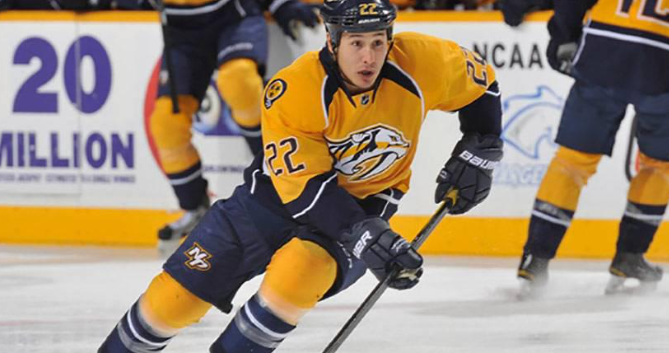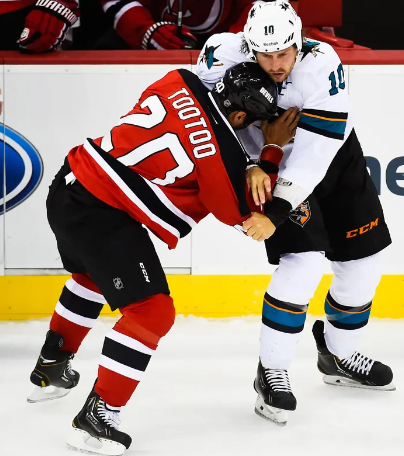The National Hockey League (NHL) is renowned for its rich history and diverse array of talent. While countless players have graced the ice over the years, few have captured the hearts of fans and the imagination of aspiring athletes like Jordin Tootoo. Hailing from Canada’s northern territories, Jordin Tootoo became not only the first Inuit player in the NHL but also an inspiring figure who overcame adversity to make a lasting impact on the sport. Let’s delve into his remarkable journey, his accomplishments, and the stories that define his legacy.

Early Life and Beginnings:
Jordin Tootoo was born on February 2, 1983, in Churchill, Manitoba, a remote community nestled along the shores of Hudson Bay. He grew up in Rankin Inlet which is an Inuit hamlet on the Kudlulik Peninsula in Nunavut, Canada. It is the largest hamlet and second-largest settlement in Nunavut. He grew up in the Inuit culture, where hockey was not just a sport but a way of life. From a young age, Tootoo displayed remarkable talent on the ice, skating on frozen ponds with makeshift equipment. His father, Barney, was a key figure in his development, providing unwavering support, hockey coaching, and guidance.
Junior Hockey Success:
Tootoo’s path to the NHL began in the Western Hockey League (WHL) with the Brandon Wheat Kings. In his final junior season, he tallied an impressive 93 points, showcasing his skill and physicality. It wasn’t long before NHL scouts took notice of this tenacious forward
NHL Debut and Tenure with The Predators
In the 2003 NHL Entry Draft, the Nashville Predators selected Jordin Tootoo in the fourth round, 98th overall. His NHL debut came on October 9, 2003, against the Anaheim Ducks. Tootoo quickly earned a reputation as a gritty, hardworking player who would do whatever it took to help his team win. His style of play endeared him to Predators fans, and he became a fan favorite in Nashville. He also wore number 22 for the Predators. Tootoo…. 22…. That’s awesome.
During his tenure with the Predators, Tootoo’s contributions went beyond the stat sheet. He was a physical presence on the ice, unafraid to drop the gloves when necessary, and his tenacity inspired his teammates. Off the ice, he became a role model for Indigenous youth, making numerous charitable efforts to support his community and raising awareness about the challenges faced by Inuit people.
Career Stats and Impact:
Throughout his NHL career, Tootoo played for the Nashville Predators, Detroit Red Wings, New Jersey Devils, and Chicago Blackhawks. He appeared in 723 regular-season games, scoring 65 goals and tallying 96 assists for a total of 161 points. While these numbers may not place him among the league’s elite scorers, his impact transcended statistics. His relentless work ethic and commitment to the game left an indelible mark on every team he played for.

Off the Ice and Personal Struggles:
Tootoo’s journey was not without its share of personal challenges. He battled alcohol addiction and faced the tragic loss of his older brother, Terence, who took his own life in 2002. These experiences deepened his commitment to advocating for mental health awareness and addiction recovery
Retirement and Legacy:
In 2018, Jordin Tootoo announced his retirement from professional hockey, ending a career defined by perseverance, resilience, and a deep connection to his roots. His legacy extends beyond the rink, as he continues to use his platform to inspire Indigenous youth, raise awareness about addiction and mental health, and advocate for the betterment of his community.
Conclusion:
Jordin Tootoo’s journey from the remote Inuit community of Rankin Inlet to the NHL is a story of determination, cultural pride, and triumph over adversity. As the first Inuit player in the NHL, he blazed a trail for future Indigenous athletes and demonstrated that no dream is tootoo big to achieve. His contributions to the game, both on and off the ice, have left an enduring legacy that will continue to inspire generations to come. Jordin Tootoo’s story is a testament to the power of perseverance and the ability of sports to bring people together, regardless of their background or circumstances.
Thanks for your time. Please leave comments and suggestions below.




